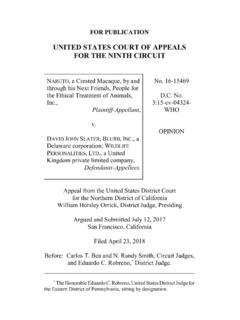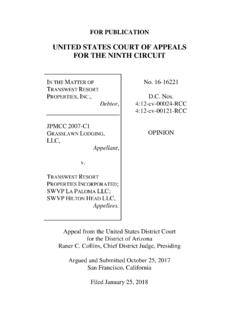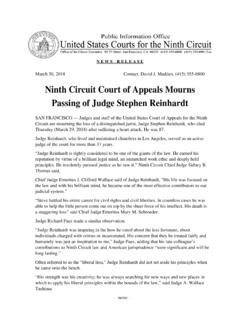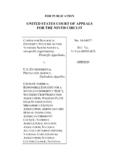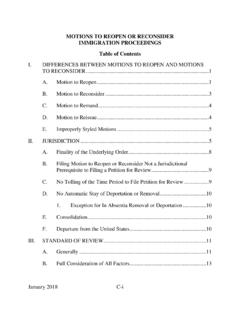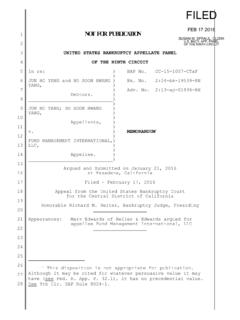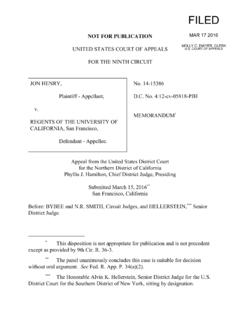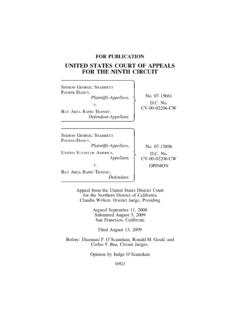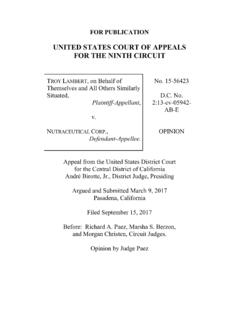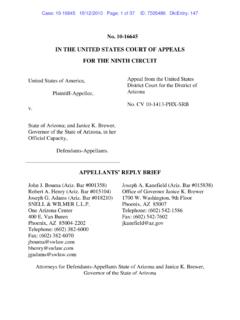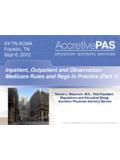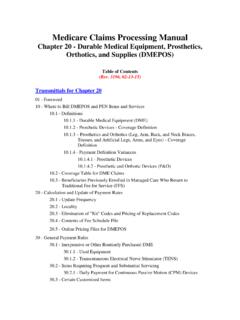Transcription of Chapter 29 - Appeals of Claims Decisions
1 medicare Claims processing manual Chapter 29 - Appeals of Claims Decisions Table of Contents (Rev. 1986, 06-11-10) Transmittals for Chapter 29 Crosswalk to Old Manuals 110 - Glossary 200 - CMS Decisions Subject to the Administrative Appeals Process 210 - Who May appeal - Provider or Supplier Appeals When the Beneficiary is Deceased 220 - Steps in the Appeals Process: Overview 230 - Where to appeal 240 - Time Limits for Filing Appeals & Good Cause for Extension of the Time Limit for Filing Appeals - Good Cause - General Procedure to Establish Good Cause - Conditions and Examples That May Establish Good Cause for Late Filing by Beneficiaries - Conditions and Examples That May Establish Good Cause for Late Filing by Providers, Physicians, or Other Suppliers - Good Cause Not Found for Beneficiary, or for Provider, Physician, or Other Supplier 250 - Amount in Controversy Requirements - Amount in Controversy General Requirements - Principles for Determining Amount in Controversy - Aggregation of Claims to Meet the Amount in Controversy 260 - Parties to an appeal 270 - Appointment of Representative - Appointment of Representative - Introduction - Who May be a Representative Back v.
2 Sebelius, No. 11-55175 archived on July 12, - How to Make and Revoke an Appointment - When to Submit the Appointment - Where to Submit the Appointment - Rights and Responsibilities of a Representative - Duration of Appointment - Curing a Defective Appointment of Representative - Incapacitation or Death of Beneficiary - Disclosure of Individually Identifiable Beneficiary Information to Representative - Assignment of Appeals Rights - Assignment of appeal Rights - Introduction - Who May be an Assignee - How to Make and Revoke a Transfer of appeal Rights - When to Submit the Transfer of appeal Rights - Where to Submit the Transfer of appeal Rights - Rights of the Assignee of appeal Rights - Duration of Transfer of appeal Rights - Curing a Defective Transfer of appeal Rights - Disclosure of Individually Identifiable Beneficiary Information to Representative - medicare Secondary Payer (MSP) Specific Limitations or Additional Requirements With Respect to the Appointment of Representatives 280 - Fraud and Abuse - Fraud and Abuse - Authority - Inclusion and Consideration of Evidence of Fraud and/or Abuse - Claims Where There is Evidence That Items or Services Were Not Furnished or Were Not Furnished as Billed - Responsibilities of Adjudicators - Requests to Suspend the Appeals Process - Continuing Appeals of Providers, Physicians, or Other Suppliers Who Are Under Fraud or Abuse Investigations - Appeals of Claims Involving Excluded Providers, Physicians, or Other Suppliers 290 - Guidelines for Writing Appeals Correspondence Back v.
3 Sebelius, No. 11-55175 archived on July 12, - General Guidelines - Letter Format - How to Establish Reading Level - Writing in Plain Language - Reading Levels - Required Elements in Appeals Correspondence 300 - Disclosure of Information - General Information - Disclosure of Information to Third Parties - Fraud and Abuse Investigations - Medical Consultants Used - Multiple Beneficiaries 310 - Redetermination - The First Level of appeal - Filing a Request for Redetermination - Time Limit for Filing a Request for Redetermination - Reporting Redeterminations on the Appeals Report - The Redetermination - The Redetermination decision - Dismissals - appeal Rights for Dismissals - Vacating a Dismissal - Dismissal Letters - Model Dismissal Notices - medicare Redetermination Notice (For Partly or Full Unfavorable Redeterminations) - medicare Redetermination Notice (for fully favorable redeterminations) - Effect of the Redetermination System and processing Requirements for Use of Secure Internet Portal/Application to Support Appeals Activities 320 - Reconsideration - The Second Level of appeal - Filing a Request for a Reconsideration - Time Limit for Filing a Request for a Reconsideration - Contractor Responsibilities - General - QIC Case File Development - QIC Case File Preparation Back v.
4 Sebelius, No. 11-55175 archived on July 12, - Forwarding QIC Case Files - QIC Jurisdictions - Tracking Cases - Effectuation of Reconsiderations 330 - Administrative Law Judge (ALJ) - The Third Level of appeal - Right to an ALJ Hearing - Requests for an ALJ Hearing - Forwarding Request to HHS/OMHA - Review and Effectuation of ALJ Decisions - Effectuation Time Limits & Responsibilities - Duplicate ALJ Decisions - Payment of Interest on ALJ Decisions 340 - Departmental Appeals Board - The Fourth Level of appeal - Recommending Agency Referral of ALJ Decisions or Dismissals - Effectuation of Appeals Council Orders and Decisions - Requests for Case Files - Payment of Interest on Appeals Council Decisions 345 - District Court Review - The Fifth Level of appeal - Requests for District Court Review by a Party - Effectuation of District Court Decisions - Payment of Interest of District Court Decisions 350 - Workload Data Analysis Program 360 - Managing Appeals Workloads - Standard Operating Procedures - Execution of Workload Prioritization - Workload PrioritiesBack v.
5 Sebelius, No. 11-55175 archived on July 12, 2012110 - Glossary (Rev. 1762, Issued: 07-02-09, Effective: 08-03-09, Implementation: 08-03-09) Adjudicator The entity responsible for making the decision at any level of the medicare claim decision making process, from initial determination to the final level of appeal on a specific claim . Administrative Law Judge (ALJ) Adjudicator employed by the Department of Health and Human Services, Office of medicare Hearings and Appeals . Affirmation - A term used to denote that a prior Claims determination has been upheld by the current Claims adjudicator. Although Appeals through the ALJ level are de novo, CMS and its contractors often use this term when a reviewer reaches the same conclusion as that in the prior determination, even though he/she is not bound by the prior determination. Amount in Controversy - The dollar amount required to be in dispute to establish the right to a particular level of appeal .
6 Congress establishes the amount in controversy requirements. Appellant - The term used to designate the party ( , the beneficiary, provider, supplier, or other person showing an interest in the claim determination) or the representative of the party that has filed an appeal . The adjudicator determines if a particular appellant is a proper party or representative of a proper party. Appointed representative The individual appointed by a party to represent the party in a medicare claim or claim appeal . Assignee (1) With respect to the assignment of a claim for items or services, the assignee is the supplier who has furnished items or services to a beneficiary and has accepted a valid assignment of a claim OR (2) With respect to an assignment of appeal rights, an assignee is a provider or supplier who is not already a party to an appeal , who has furnished items or services to a beneficiary, and has accepted a valid assignment of the right to appeal a claim executed by the beneficiary.
7 Assignment of appeal rights The transfer by a beneficiary of his or her right to appeal under the Claims appeal process to a provider or supplier who is not already a party, and who provided the items or services to the beneficiary. Assignor A beneficiary whose provider of service or supplier has taken assignment of a claim , or assignment of an appeal of a claim . Back v. Sebelius, No. 11-55175 archived on July 12, 2012 Authorized representative An individual authorized under State or other applicable law to act on behalf of a beneficiary or other party involved in the appeal . The authorized representative will have all of the rights and responsibilities of a beneficiary or party, as applicable, throughout the Appeals process. Beneficiary Individual who is enrolled to receive benefits under medicare Part A or Part B. Departmental Appeals Board (DAB) Review - The part of the DAB that reviews medicare cases is called the medicare Appeals Council (herein Appeals Council).
8 A party to the ALJ hearing may request review by the Appeals Council within 60 days after receipt of the notice of the ALJ s hearing decision or dismissal. The Appeals Council conducts a de novo review of the ALJ decision , and may adopt, modify or reverse the ALJ s decision , or may remand the case to an ALJ for further proceedings. In reviewing an ALJ s dismissal order, the Appeals Council may deny review or vacate the dismissal and remand the case to an ALJ for further proceedings. The Appeals Council will dismiss a request for review when a party does not have a right to Appeals Council review. The Appeals Council may also dismiss a request for a hearing for any reason the ALJ could have dismissed the request for hearing. The Appeals Council may also decide on its own motion to review a decision or dismissal issued by an ALJ within 60 days after the date of the hearing decision or dismissal. In addition, CMS may refer a case to the Appeals Council for it to consider under its own motion review authority within 60 days after the date of the hearing decision or dismissal.
9 This is known as an Agency Referral . The Appeals Council may adopt, modify, or reverse the ALJ s decision , may remand the case to an ALJ for further proceedings, or may dismiss an Agency Referral request. De Novo - Latin phrase meaning anew or afresh, used to denote the manner in which Claims are adjudicated through the ALJ level of appeal . Adjudicators at each level of appeal make a new, independent and thorough evaluation of the claim (s) at issue, and are not bound by the findings and decision made by an adjudicator in a prior determination or decision . Decisions and Determinations -If a medicare appeal request does not result in a dismissal, adjudication of the appeal results in either a determination or decision . There is no apparent practical distinction between these two terms although applicable regulations use the terms in distinct contexts. A decision that is reopened and thereafter revised is called a revised determination.
10 Dismissal - A request for appeal may be dismissed for any number of reasons, including: 1. Abandonment of the appeal by the appellant; 2. A request is made by the appellant to withdraw the appeal ; 3. An appellant is determined to not be a proper party; Back v. Sebelius, No. 11-55175 archived on July 12, 20124. The amount in controversy requirements have not been met; and 5. The appellant has died and no one else is prejudiced by the Claims determination. Parties to the redetermination have the right to appeal a dismissal of a redetermination request to a qualified independent contractor (QIC) if they believe the dismissal is incorrect. If the QIC determines that the contractor incorrectly dismissed the redetermination, it will vacate the dismissal and remand the case to the contractor for a redetermination. It is mandatory for the contractor to conduct a redetermination on any case that is remanded to it by the QIC and issue a new decision .
